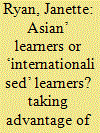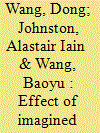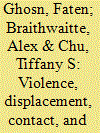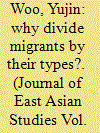|
|
|
Sort Order |
|
|
|
Items / Page
|
|
|
|
|
|
|
| Srl | Item |
| 1 |
ID:
145518


|
|
|
|
|
| Summary/Abstract |
The contemporary context of higher education around the world is characterised by increasing international ‘contacts’ between higher education systems. These include increased ‘flows’ of international students, as well as rapidly growing numbers of academic collaborations through international research partnerships and transnational teaching programmes. Yet, much of the literature on international students tends to focus on how international students, and Chinese students in particular, may lack particular Western academic knowledge and values. Identifying groups as, for example, ‘Asian’, ‘Chinese’ or ‘Confucian culture heritage’ learners runs the risk of stereotyped views of international students and the desirability (for all students) of attaining only ‘Western’ academic knowledge and skills. The rise in the internationalisation of universities around the world has seen not just an increase in international student numbers, but changes to the ‘four Ps’ of higher education: policies, programmes, pedagogy and partnerships. Interestingly, the direction of student flows is beginning to change from mainly ‘east’ to ‘west’, and there is a growing interest in how these interactions can lead to more globalised and intercultural learning outcomes not only just for international students, but also for local students and staff. This article draws on theories of transculturalism, contact theory and the core principles of the UK Higher Education Academy’s Internationalising Higher Education Framework. In the context of the proliferation of universities’ internationalisation policies and the increasing cultural diversity of university staff and student populations, these theories and principles can provide a foundation for examining how increased contact between Western and Asian higher education systems can lead to learning and knowledge outcomes that can better serve individuals and organisations in the current ‘global era’. It reports research that illustrates how academics’ notions of ‘scholarship’ and ‘learning’ in both contexts are either shared or differ and points to how the common academic values can be the basis for mutual understanding, and the differences can be the source of mutual learning.
|
|
|
|
|
|
|
|
|
|
|
|
|
|
|
|
| 2 |
ID:
177018


|
|
|
|
|
| Summary/Abstract |
Social identity theory (SIT) suggests that perceived identity difference between groups predicts to intergroup conflict, including interstate conflict. Contact theory suggests that social contact between groups can help reduce intergroup conflict. Contact theory, however, has not traditionally focused on perceived identity difference, and it has not been tested much on real-world interstate conflicts. Employing an experimental design, our study tests for the effects of imagined social contact on Chinese students’ generally malign perceptions of identity difference with Japanese people. We find that imagined contact reduces key perceptions of difference by reducing both perceived Japanese malignity and perceived Chinese benignity. This suggests that social contact helps produce new hybrid in-group. By employing SIT, our findings provide a new microfoundation for contact theory, suggest an important process in the creation of security communities, and provide a proof of concept for public policies aimed at large-scale cultural exchanges.
|
|
|
|
|
|
|
|
|
|
|
|
|
|
|
|
| 3 |
ID:
153321


|
|
|
|
|
| Summary/Abstract |
Segregation has long been recognized as a source of ignorance which breeds negative feelings and hostility. This view maintains that interactions between members of different groups can foster social bonds and promote positive group relationship. Employing recently collected survey data, this study examines the effect of cross-Strait contacts on Taiwan citizens’ negative views toward Chinese citizens and the Beijing government. The empirical results show that casual encounters have no effect on the island residents’ general perception of China. Serious interactions in the form of friendship moderate their unfavorable feelings of Chinese citizens but have no effects on the perception of a hostile Beijing. Unless contacts can invoke true social bonds, frequent interactions do not have transformative effects on individuals’ political views. The moderating effect of contacts at the personal level is not transferable to a political entity when the latter is perceived as a suppressing agent.
|
|
|
|
|
|
|
|
|
|
|
|
|
|
|
|
| 4 |
ID:
187556


|
|
|
|
|
| Summary/Abstract |
Mistrust is a common cause of conflict between individuals belonging to different identity groups. When can such mistrust be overcome? We present a theoretical model of trust-building across social identity groups to address this question. Trust between groups increases when individuals in one group are willing to take a chance on engaging with members of the other group, their engagement is positively reciprocated, and they are able to credibly communicate the experience to their fellow group members, thereby increasing their belief that members of the other group are trustworthy. This process is made easier if the individuals are not too hostile to the out-group, are flexible enough to change their beliefs in response to new information, and are sufficiently attached to their own group to be honest about their experiences with out-group members.
|
|
|
|
|
|
|
|
|
|
|
|
|
|
|
|
| 5 |
ID:
164559


|
|
|
|
|
| Summary/Abstract |
How do individuals’ personal experiences with various aspects of political violence affect their attitudes toward hosting conflict refugees? More specifically, how do their personal exposure to violence, their own personal experience of being displaced, and their recent contact with refugees influence these attitudes? To explore answers to these questions, we draw upon a recent survey of 2,400 Lebanese residents where we identify individuals who experienced violence during the Lebanese civil war (1975–90), those forced to flee their homes during that conflict, and those who enjoy recent contact with Syrian immigrant and/or displaced populations. We examine whether these distinct experiences affect respondents’ regard for members of the Syrian refugee population. Results demonstrate that historical exposure to violence and experience of displacement have no discernible impact on individual attitudes toward hosting refugees. We find much stronger evidence that attitudes are associated with whether individual respondents have had contact with Syrians in Lebanon; those with such interactions are significantly more likely to support hosting refugees, to consider hiring a refugee, or to allow one of their children to marry a refugee. Our findings suggest exposure to violence by itself does not correlate to positive sentiments toward refugees, especially over time. Further, finding ways to create positive contact between refugees and native populations may be associated with improving attitudes and relations between the two populations.
|
|
|
|
|
|
|
|
|
|
|
|
|
|
|
|
| 6 |
ID:
179556


|
|
|
|
|
| Summary/Abstract |
This article compares the public perceptions of various types of migrants in Japan and examines whether Japanese view them equally. Using an original survey, which presented six types of migrants that Japanese people most commonly face in their daily lives, I show several interesting results. First, respondents express the most negative views toward labor migrants. Second, respondents who have migrant friends tend to have more positive feelings for all types of migrants. In contrast, simple coexistence with migrants fails to enhance public sentiment toward labor migrants, particularly those whose stay is temporary. Overall, my statistical results suggest that Japanese people are not pessimistic about every kind of migrant, and their openness increases as migrants acculturate into Japanese society and interact with Japanese people. These findings provide evidence to influence policy discussions on whether Japan should recruit labor migrants in its current form in order to fight its aging population.
|
|
|
|
|
|
|
|
|
|
|
|
|
|
|
|
|
|
|
|
|